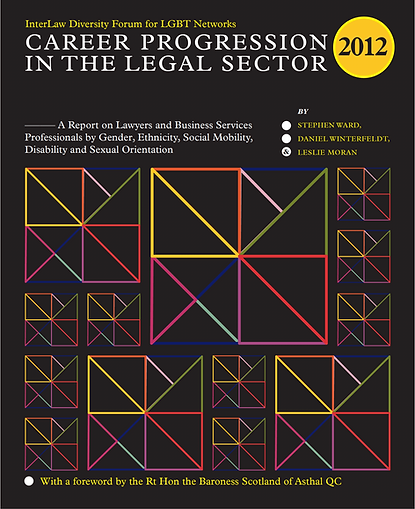Career Progression in the Legal Sector (2012)
BACKGROUND
When the Interlaw Diversity Forum was founded in 2008, there was a dearth of research on Diversity & Inclusion in the legal profession and most was limited to individual D&I strands. Existing research did not cover the profession as a whole from a D&I standpoint.
Further, existing research took either a qualitative or quantitative approach. This led to qualitative research being dismissed as "complaining” by “non-performing” lawyers; or quantitative research failing to provide the necessary context to aid understanding the experiences of diverse talent.
In 2010, the Law Society had planned a series of research reports on barriers to career progression for women and ethnic minorities, but not sexual orientation. To fill this gap, we offered to conduct our own research report, The Career Experience of LGB Solicitors. This report was published alongside the Law Society's own reports on women and ethnic minority solicitors under the collective name, The Barriers Reports.
When The Barrier Reports were read together, we saw more fundamental similarities than differences in these three different groups’ professional experiences. This motivated publication of our next research report, Career Progression in the Legal Sector (2012), to explore our hypothesis that diverse lawyers were all facing many of the same fundamental barriers to career progression.
Career Progression in the Legal Sector (2012)
In July 2012, the InterLaw Diversity Forum, with support from The Law Society and the Bar Council, surveyed almost 2,000 respondents from all strands of diversity and inclusion in the UK legal sector. Our 2012 research was unique at the time in that it surveyed all strands of diversity in the legal profession. From this data we published our ground-breaking report Career Progression in the Legal Sector, with a preface from Baroness Patricia Scotland PC QC.
The report combined hard data with respondents’ perceptions of their own career progression, as well as their perception of the fairness and transparency of policies and practices in their workplaces.
The goal of the report was to identify the barriers facing these diverse groups and to provide recommendations to address and ultimately solve these issues.
The report told us that lawyers from protected classes under the Equalities Act and from disadvantaged backgrounds were working harder and earning less than their straight, white, elite-educated male counterparts. In fact, the more “boxes” they ticked (i.e. intersectionality/multiple identities) with regards to diversity and social mobility, the more pronounced this disadvantage became, or "the harder you worked for less".
We recommended in this report that law firms needed to change their cultures to become more meritocratic by: (i) adopting targets; (ii) changing culture; (iii) training their leaders; and (iv) addressing social mobility.
Guided by our research, which showed that different diverse groups were facing fundamentally the same challenges to career progression in the legal sector, we began shifting our focus to include other strands of diversity, and to examine the intersectionality of these strands (“multiple identities”). Since then have expanded our scope beyond LGBT+ to encompass all strands of diversity and inclusion (Race & Ethnicity, LGBT+, Disability, Gender) as well as social mobility.
(The full report is set out here.)
The InterLaw Diversity Forum collected additional data in 2018, and again in Spring 2020, in order to publish an updated Career Progression Report. This updated report, using these two additional data sets, will assess what progress has been made in the UK legal sector since the original report. It will track progress, identify barriers, and determine the best ways to effect positive cultural change in the legal sector. Publication will take place in 2021.
Research Leads:
Dr. Lisa Webley, Head of Birmingham Law School
Daniel Winterfeldt, Founder and Chair, InterLaw Diversity Forum

